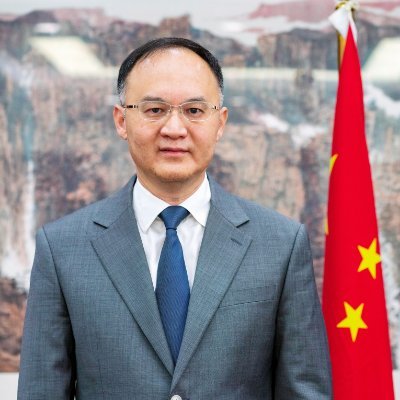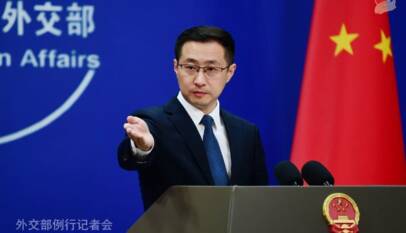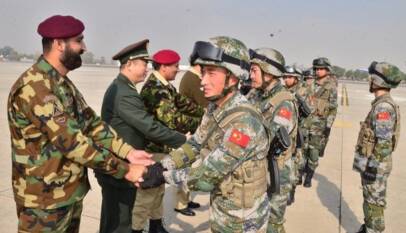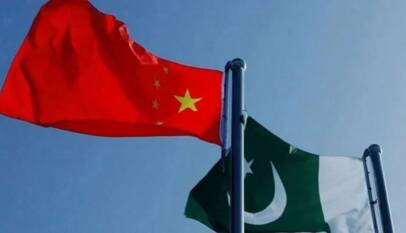China and Pakistan to continue their bilateral relationship: Ambassador Nong
In an interview, Chinese Ambassador to Pakistan, Nong Rong said that Pakistan and China are time-tested strategic cooperative partners and their bilateral brotherly relations have witnessed new highs since the launch of CPEC. He said that the current year is of special importance for the two countries as it marks the 70th anniversary of the establishment of diplomatic relations between China and Pakistan. He also said that the CPEC, being the pilot project under the BRI, has made remarkable progress in recent years, contributing significantly to Pakistan’s economy, social development, and connectivity, with great benefit made to the country and the region. Moreover, he pledged that China will continue to regard Pakistan as its top priority for vaccine cooperation to help Pakistan overcome the pandemic at an early date and build a China-Pakistan health community.
Pakistan and China are time-tested strategic cooperative partners and the bilateral brotherly relations have witnessed new highs since the launch of China-Pakistan Economic Corridor (CPEC) some six years back. The current year is of special importance for the two countries as upcoming May 21 marks the 70th anniversary of the establishment of diplomatic relations between China and Pakistan.
Ambassador of People’s Republic of China in Islamabad Nong Rong exclusively talked to Daily Times on issues ranging from CPEC to Covid-19 cooperation as well as the baseless propaganda campaign unleashed by the Western nations who are not only jealous of Pakistan-China exemplary relations but are also fearful of China’s unprecedented growth on the economic front and growing influence in the world affairs.
Q: US President Joe Biden has suggested launching an initiative by the so-called ‘democratic’ countries to counter China’s Belt and Road initiative. How do you see this proposal at a time when Western nations are ganging up against China while fearing its unprecedented growth on the economic front and growing influence in the international affairs?
A: China sticks to develop relations with other countries based on mutual respect and equality, win-win cooperation, and is committed to building of a new type of international relations and a community with a shared future for mankind. The CPEC, being the pilot project under the BRI, has made remarkable progress in recent years, contributing significantly to Pakistan’s economy, social development, and connectivity, with great benefit made to the country and the region.
The suggestion made by the US to band together democratic countries to fund infrastructure is by no means comparable to the BRI. It is in essence to pursue confrontation between blocs and targeting to the third country. This initiative is driven by “America First” mentality, which is significantly different with BRI serving as public good to benefit the local people. The US pursuit of Cold War mentality and confrontation between blocs are bound to be rejected as they run counter to the trend of the times and the common aspiration of regional countries.
Q: China-US relations are facing severe tests as President Joe Biden has taken an extraordinarily tough line with China. How do you see China’s relation developing with the US under Biden?
A: Interaction between China and the US concerns global peace, stability, development and prosperity. With challenges in the era of globalization and the post-pandemic era, China and the US should have more dialogue and cooperation rather than game and confrontation. Both countries should fulfill obligations and responsibilities as major countries. China is willing to respond to the expectations of all parties and continue to make its own efforts to this end.
Regarding the arguments of competition, cooperation and confrontation repeatedly put forward by the US on its relations with China, China’s position is consistent and clear. China welcomes dialogue on the basis of equality and mutual respect. China does not approve of one-upmanship in the world, and does not accept that one country has the final say in world affairs. China welcomes cooperation if there is the need, but cooperation needs to take into account each other’s concerns and mutual benefit. It cannot go in the fashion of one side unilaterally raising conditions and making lists. China will not evade competition if it is needed, but competition should be fair and just and abide by market rules, and refrain from setting obstacles, abusing power, and depriving others of their legitimate right to development. If there is still confrontation, China will deal with it calmly and face it fearlessly. We resolutely resist gross interference in China’s internal affairs, and oppose unlawful unilateral sanctions imposed on the basis of lies and false information. China will not compromise or retreat, as it sticks to the basic norms of international relations and stands for the interests of many developing, small and medium-sized countries. China definitely has the right to fight back since every country must defend national sovereignty and dignity.
Dialogue is better than confrontation, and cooperation is better than confrontation. As President Xi Jinping put it, China will work with the US to uphold the spirit of non-conflict, non-confrontation, mutual respect and win-win cooperation, and advance a China-US relationship featuring coordination, cooperation and stability. We urge the US to truly respect China’s core interests and take a correct view of China’s development, actively respond to the expectations of regional countries and the international community, work with China to show what a major power should be like, and jointly maintain regional and world peace, stability and development.
Q: Unfortunately, Pakistan has been facing a tense situation on its eastern border for decades due to jingoistic attitude of India, especially under Narendra Modi. India has border disputes with China as well. Do you think India’s irresponsible attitude is a major stumbling block in the way of peace and development in South Asia region?
A: It is the legitimate right for every country to safeguard its own sovereignty and territorial integrity. Since the founding of PRC, China has firmly safeguarded its national sovereignty, security and development interests. In the meanwhile, China has demarcated boundary with 12 of its 14 land neighbours through friendly negotiations, turning land borders into bonds of friendly cooperation.
The merits of what happened on China-India border are very clear. None of the responsibility for tension and confrontation lies with China. We are against any provocations, and hope the other side can take real actions to restore peace and stability in the border areas. To resolve border differences peacefully through dialogue is a prerequisite for a country to win the trust of its neighbors and stand with dignity in the region. This principle applies to all countries.
Q: On March 30, the Standing Committee of the National People’s Congress deliberated on and adopted the amendments to Annex I and II to the Basic Law of the Hong Kong SAR. Some countries including the UK and US have accused this move as a breach of the Sino-British Joint Declaration, undermining Hong Kong’s democracy and the freedoms of the Hong Kong residents, and breaking China’s international obligations. What is your comment?
A: Hong Kong is China’s Hong Kong. The well-known “one country, two systems”, “one country” is the prerequisite. Hong Kong affairs are entirely China’s internal affairs. In recent times, in order to achieve the lasting prosperity and stability of Hong Kong, China has made positive progress in laws and systems in terms of safeguarding national security and ensuring that patriots govern Hong Kong. The improvement of the electoral system is to better reflect the broad and balanced political participation of Hong Kong residents, and to better take into account the interests of all classes, sectors, and aspects of society, which is conducive to improving the governance efficiency of the Hong Kong, and is conducive to improving Hong Kong’s political, social and business environment as well as rule of law.
We firmly oppose foreign interference in China’s internal affairs, and oppose the distorted interpretation and malicious discredit to the efforts made by the Central Government of China and the Hong Kong Special Administrative Region Government. During the 150-plus years of British colonial rule, Hong Kong residents had suffered much suppression. There was no human rights or democracy at all. May I ask, during that period, why did Britain and the United States does not propose the issue of human rights and democracy in Hong Kong? Obviously, what they care about is not Hong Kong people. They merely use the Hong Kong issue as a card, trying to hinder the rapid development of China and Hong Kong. The relevant parties should stop playing double standards, stop looking with colored glasses, and stop politicizing the Hong Kong issue. We firmly believe that Hong Kong will usher in a brighter future.
Q: The United States and some Western countries claim that China’s actions in Xinjiang constitute what they call “genocide”. This has angered the Chinese people. What’s your comment on this? Please introduce the social and economic development of Xinjiang in recent years.
A: Allegations of “genocide” and “forced labor” are lies of the century. They were ugly farces directed by a handful of colluding individuals in the political, media and academic fields. These people have never been to Xinjiang. They have no idea what a beautiful place it is and how residents are enjoying their lives. Xinjiang’s Uyghur population more than doubled in the past 40 years. Have they ever seen this kind of genocide? Xinjiang’s development and progress over the years is all-round, supported by facts and data. No country should use this accusation as a political label for rumor-mongering and malicious manipulation.
In recent years, Xinjiang has made unprecedented achievements in economic and social development and improvement of people’s livelihood. From 2014 to 2019, the GDP of Xinjiang increased from 919.59 billion yuan to 1.36 trillion yuan, with an average annual growth rate of 7.2 percent. The per capita disposable income in Xinjiang increased by an average annual rate of 9.1 percent. People in Xinjiang are living and working in peace and contentment. Today the region has not seen a single violent terrorist case for more than four consecutive years. The legitimate rights and interests of the people of all ethnic groups in Xinjiang have been protected. All ethnic groups have the same legal status and enjoy various rights in accordance with the law, including participation in the management of state affairs, freedom of religious belief, receiving education, using their own languages, and preserving their traditional culture.
Pakistan’s Ambassador to China Moin ul Haque recently paid a visit to Xinjiang. He spoke highly of the all-round development of Xinjiang and was particularly impressed by the development of transportation and agriculture. He visited mosques and got briefing from the Imam. He told the reporting, saying that “the notable and important thing is that there is freedom of religion in China, and it is enshrined in the Constitution of China. He criticized the propaganda made by the outsiders against Xinjiang. We sincerely welcome people from various sectors in foreign countries to visit Xinjiang and see the beautiful scenery, people’s happy life and the region’s economic development. Rumors cannot spread when people are truly well-informed. Justice will always prevail.
Q: The third wave of the pandemic in Pakistan keep spreading, and vaccines play a key role in helping Pakistan fight the epidemic. What kind of vaccine cooperation has China and Pakistan carried out? How do you evaluate the significance of the vaccine cooperation between the two parties?
A: China and Pakistan are good brothers and true friends. In the face of the sudden outbreak of the Covid-19, China and Pakistan have been helping each other by every mean. China has always regarded Pakistan as priority for anti-pandemic cooperation and has provided Pakistan with a large amount of material and financial assistance. China will continue to provide support within its capacity for Pakistan’s fight against the COVID. Pakistan is the first country to receive vaccine aid from Chinese government and military. China has provided 2 million doses of vaccine to Pakistan, and the Chinese military will provide an additional 250,000 doses of Cansino vaccine. At the same time, we will also start vaccine production cooperation with Pakistan and set up a plant to subpackage vaccine in Pakistan. This will effectively help Pakistan improve its vaccine self-supply capacity and further reduce its price.
China will continue to regard Pakistan as its top priority for vaccine cooperation. In the next step, China will provide assistance within its capacity for Pakistan’s vaccination plan, continue to deepen cooperation in vaccine supply and phase III clinical trials, to help Pakistan overcome the pandemic at an early date and build a China-Pakistan health community.
Q: At present, there are less than 300 days left before the Beijing Winter Olympics. What is the current progress of preparations? Is it affected by the new crown epidemic? Please tell us more details.
A: The 2008 Beijing Olympics was a complete success, which received strong support and active participation from Pakistan. Today, the Beijing 2022 Olympic Winter Games has entered the sprint phase, and all preparations are progressing smoothly, especially the deployment of COVID-19 pandemic prevention and control, which was termed as “a miracle” from the praise made by the International Olympic Committee president Thomas Bach. China is well-known for its ability to host big events. The international community has great expectation and good confidence in the success of the Beijing Winter Olympics, which is of special significance for strengthening cultural exchanges and mutual learning among civilizations. We firmly oppose the attempts to politicize the Olympic Games out of political motivations. We are willing to strengthen exchanges and cooperation with Pakistan and warmly welcome Pakistani athletes to participate in the Beijing Olympics.
CPEC’s Success Story: $25 Billion Invested Across 38 Completed Projects
ISLAMABAD: A total of 38 projects worth over $25 billion have been completed and 23 develo…












